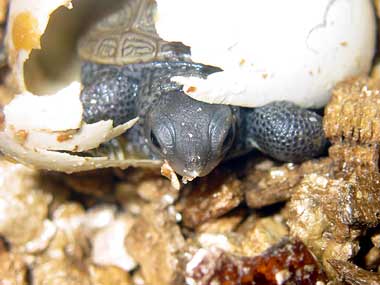Our Terrapins Need Your Help! Adopt a Terrapin! |
|
What is a terrapin?
![]()
Diamondback terrapins are relatively small, harmless turtles that live in salt marshes (like the ones at the Wetlands Institute!) along the Atlantic and Gulf coasts of the United States. Diamondback terrapins are closely related to freshwater turtles such as map turtles and red-eared sliders, but terrapins are the only turtles that live exclusively in brackish water.
Why are terrapins important?
![]()
The diamondback terrapin is suggested to be a keystone species whose very presence contributes to the diversity of life and whose loss of population may result in negative impacts to the salt marsh ecology along the Atlantic coastline. For instance, terrapins are a predator of periwinkles, fingernail-size snails that feed on salt marsh grass. In recent years, some southern salt marshes of the United States have experienced explosive populations of periwinkles possibly due to over-fishing of their predators (i.e. blue crabs). The increase in periwinkles has destroyed thousands of acres of salt marsh, converting beautiful marsh meadows into mudflats. The destruction of wetland habitats may lead to increased flooding, ultimately affecting coastal property values. The Wetlands Institute values the importance of diamondback terrapins to the wetland ecosystem. As a result, for two decades we have focused our conservation efforts on terrapin research, management, and educational programming.
Why do the terrapins need help?
![]()
Diamondback terrapins face a variety of problems attributable to human activities both historically and currently. In the late 1800s and early 1900s terrapins were hunted intensively because their meat was considered to be a gourmet delicacy. Consequently, terrapin populations were drastically reduced throughout their range. More recently, terrapins have lost most of their natural nesting habitat (sand dunes or barrier beach islands) due to development of coastal resort communities. Nowadays the only nesting habitat available to female terrapins along the Atlantic coast of New Jersey is the embankments of roads crossing and adjacent to coastal salt marshes. Locally, many hundreds of adult female terrapins are maimed or die each year during the nesting season (normally late May through mid July) while attempting to cross roads in search of suitable nesting habitat. Sadly, these problems are not the biggest threat to terrapin populations at present. Throughout their range, thousands of terrapins die each year by drowning in commercial crab traps.
How is the Wetlands Institute helping?
![]()
Every year researchers at the Wetlands Institute help thousands of diamondback terrapins. Researchers engage in a variety of terrapin conservation projects including road patrols, “head-starting” hatchlings, rehabilitating injured adults, study of wild populations, and public education. Moreover, Terrapin Excluder Devices, invented and extensively tested at the Wetlands Institute, are required modifications for some of the commercial-type traps used in New Jersey, Maryland, and Delaware.
- What will your contribution be used for?
- Documentation of data vital for research and conservation activities
- Road patrols to remove female terrapins from roads before they get hit by vehicles, rescue injured terrapins, and save potentially viable eggs retrieved from road-killed female terrapins
- Hatching, “head-starting,” and releasing baby terrapins
- Rehabilitating adult females struck by motor vehicles
- Publicizing the plight of terrapins in local to international locations
Your gift will be used to help defray expenses connected with a variety of terrapin projects at the Wetlands Institute including:
How Can You Help?
|
Support advanced technological research by adopting a diamondback terrapin with a small transmitter attached to its carapace (shell). The transmitter sends a unique signal through the water to a receiver that is attached to a buoy located in the marsh. Each time a terrapin swims by an underwater acoustic receiver, information is recorded. The information collected by the receiver is used to determine where a terrapin is, the duration a terrapin stays in an area, how far it moves, and how long it takes to move from one location to another. This information is extremely valuable because little is known about terrapin movements. Receive an adoption certificate, a report on the terrapin movements (especially your adopted terrapin!), terrapin conservation brochures, a photograph of a terrapin with a transmitter, Terrapin Times (the fall and spring terrapin newsletter), plus “Terrapin Crossing” goodies (sign, magnet and two turtle X-ing T-shirts), and help release a head starter at a special terrapin release event during the summer! In addition, research scientists will take you and a guest on a boating excursion through the wetlands to view the telemetry equipment and to learn first-hand how it works. Can’t stop with just one egg? Adopt a dozen! Receive an adoption certificate, terrapin conservation brochures, a photograph of a group of basking terrapins, Terrapin Times newsletter, plus turtle gifts (including an “I brake for turtles” bracelet, turtle pencil, and a large "I Brake for Terrapins" magnet), and help release a head starter at a special terrapin release event during the summer! Receive an adoption certificate, terrapin conservation brochures, a photograph of a terrapin, Terrapin Times newsletter, plus a large “I Brake for Terrapins” magnet, and help release a head starter at a special terrapin release event during the summer! Receive an adoption certificate, terrapin conservation brochures, a photograph of a terrapin, Terrapin Times newsletter, plus an “I brake for turtles” bracelet, and turtle pencil! Receive an adoption certificate, terrapin conservation brochures, and a photograph of a terrapin!
|
